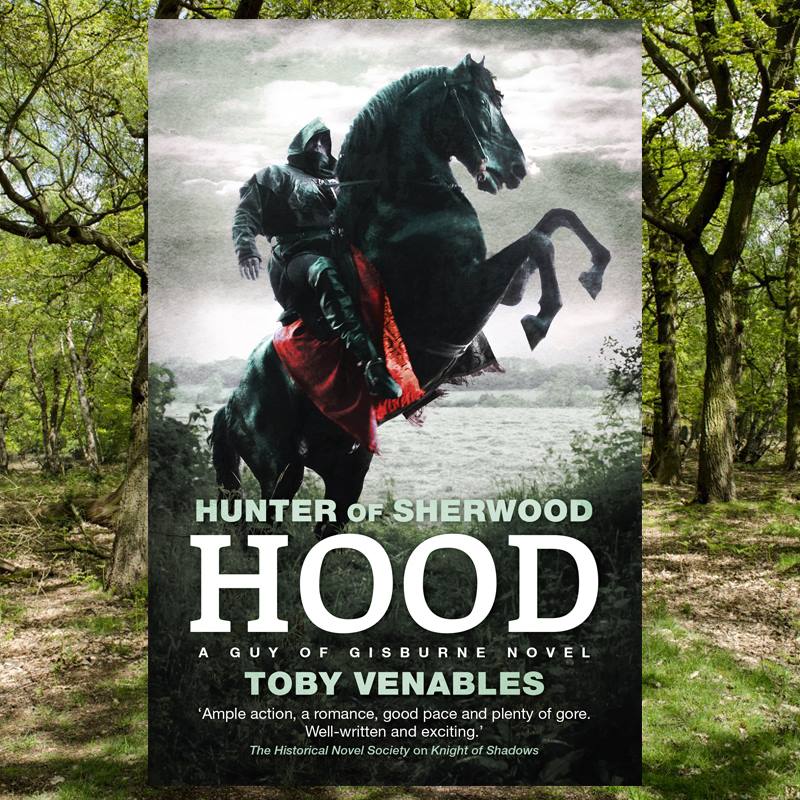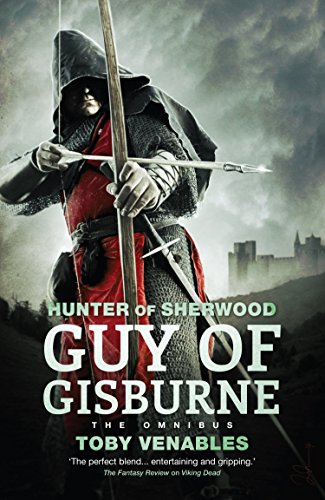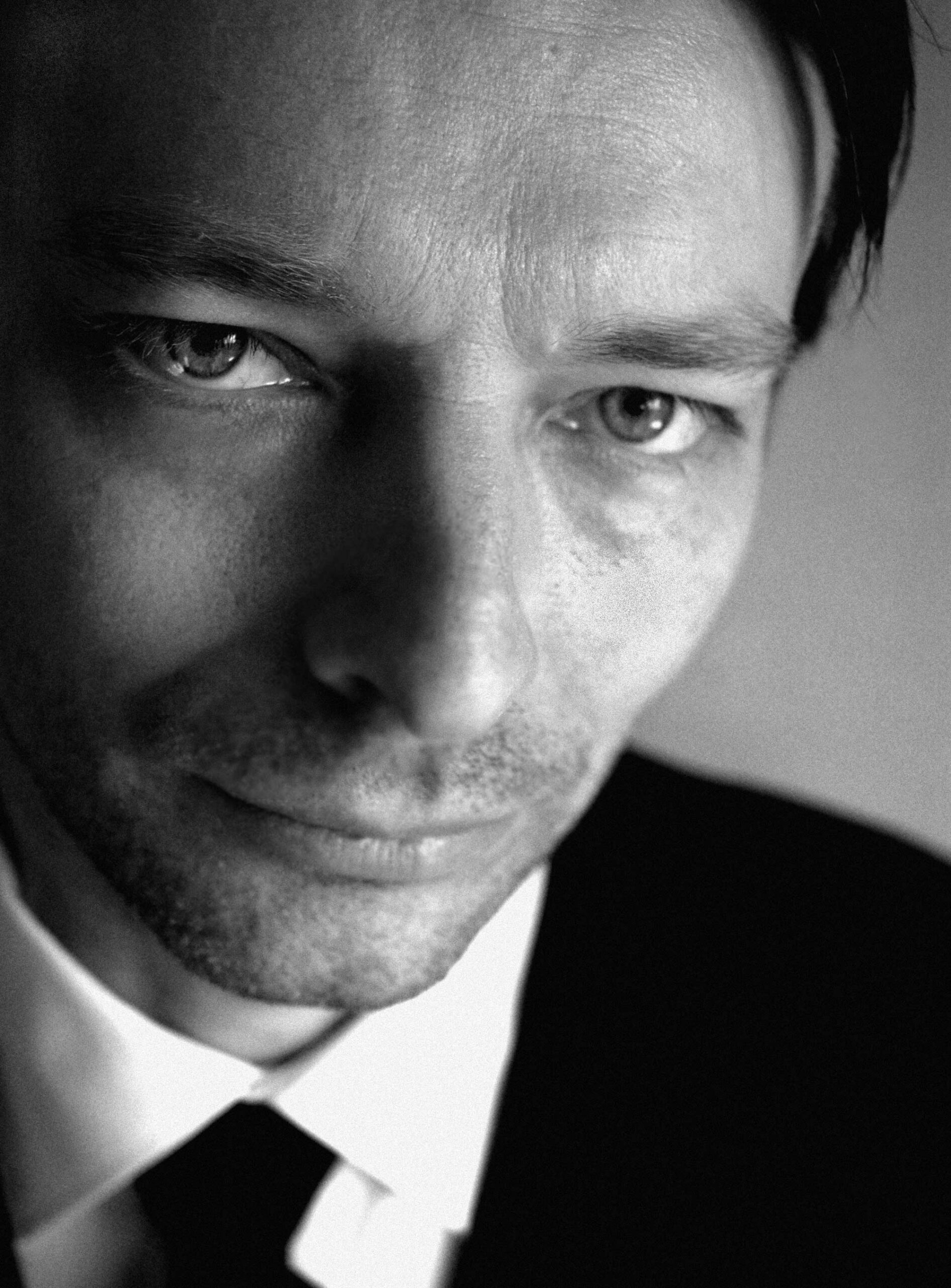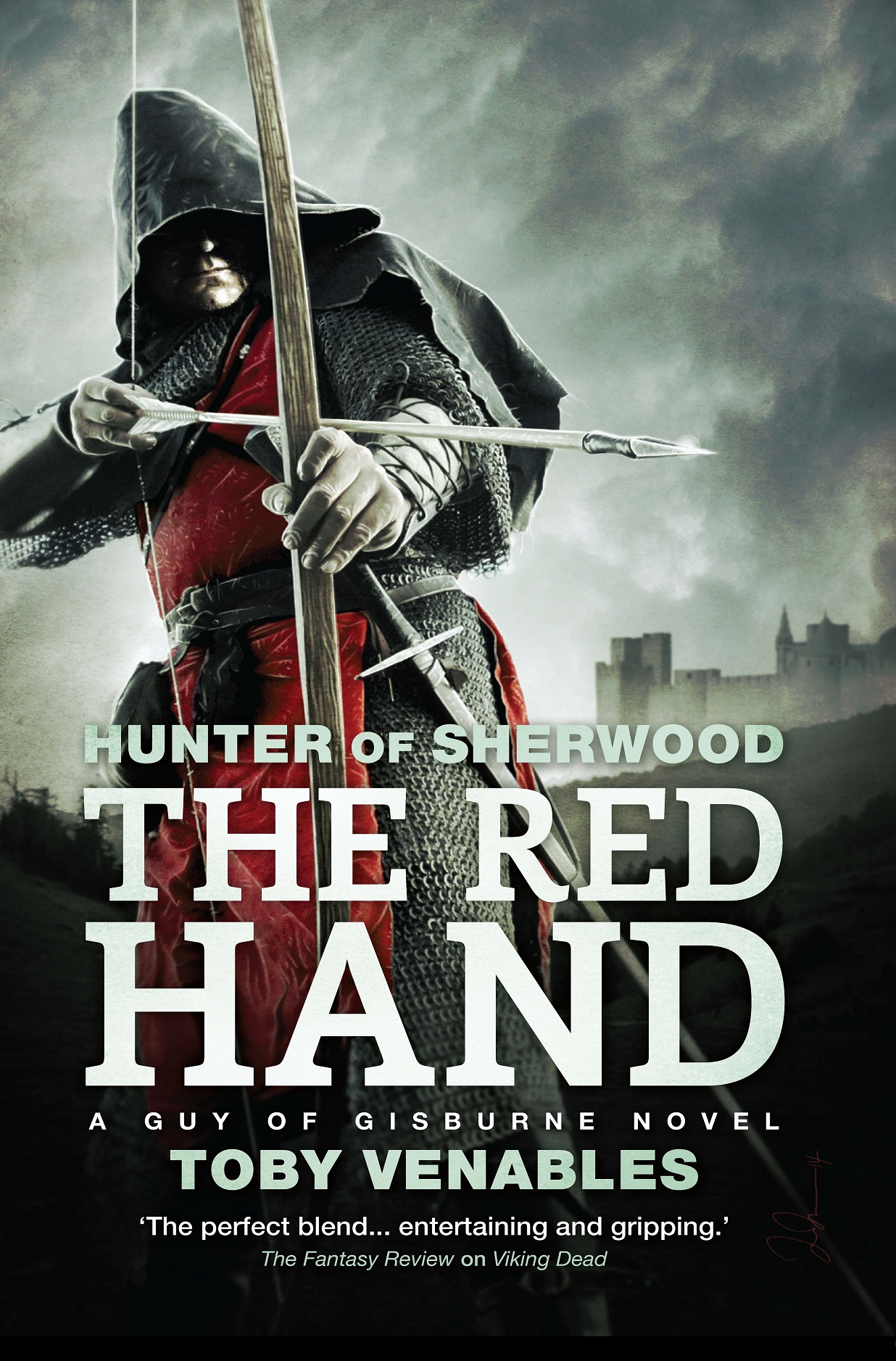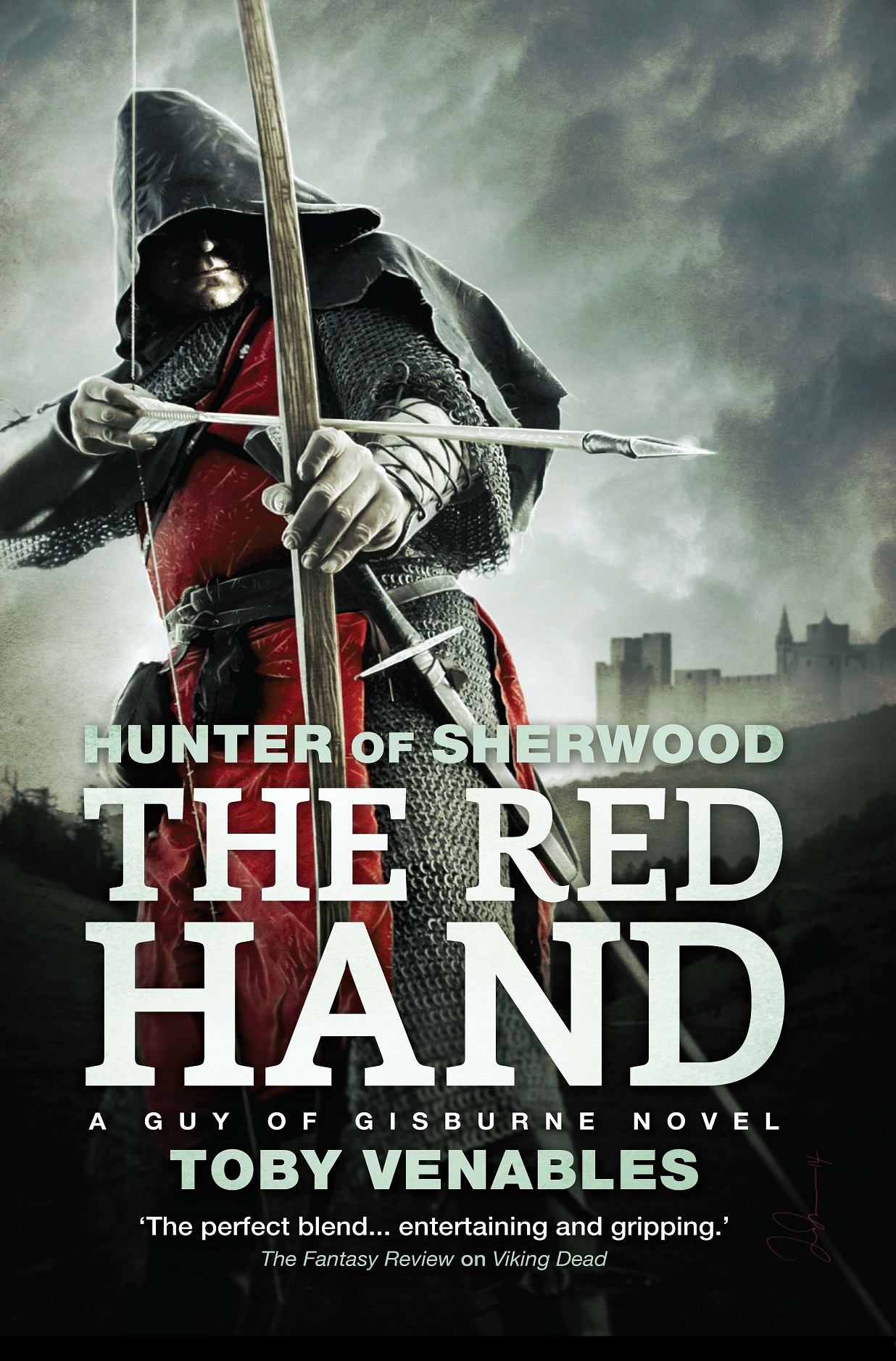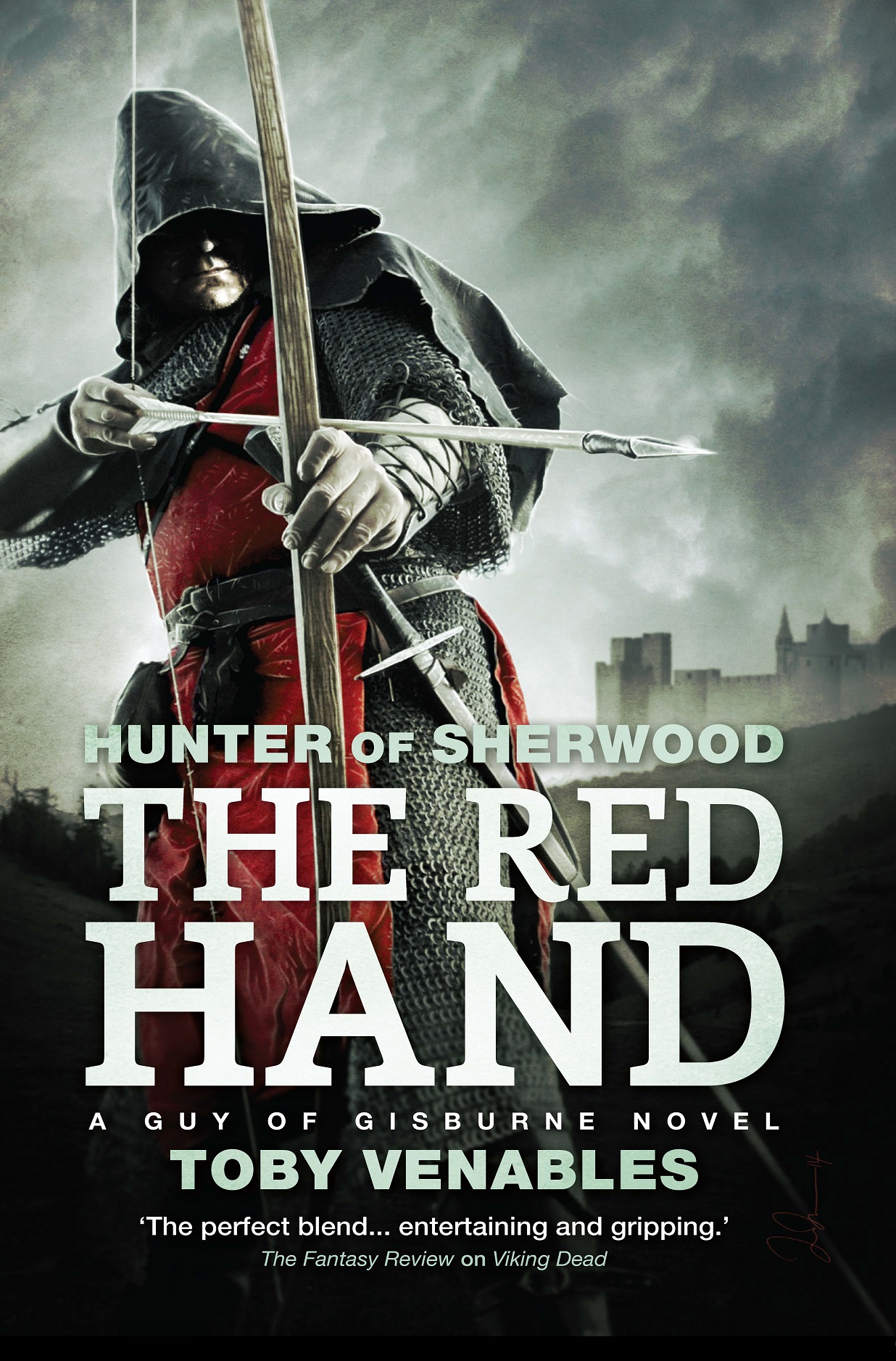
Welcome to the second of out three part installment of the director’s cut from Toby Venables’ latest Hunter of Sherwood novel, The Red Hand.
Eleanor of Aquitaine
The Great North Road – 16 May, 1193
They say troubles come in threes. Gisburne had never heard a sound explanation as to why the universe should be so numerically organised, whether with regard to good fortune or bad, but when he mused upon it later, the sixteenth day of May in the Year of Our Lord 1193 – Whitsunday – did seem to offer some compelling evidence to support the popular view.
It was late that afternoon – with the morning’s ill-equipped outlaws already a distant memory – when the second of the day’s troubles bore down upon them, and it came upon a red horse.
Galfrid, lagging behind, had dismounted to examine Mare’s hooves, and Gisburne had dropped back to see what the problem was.
“This shoe’s giving her gip,” said the squire with a sigh, slapping her left shoulder. “A nail’s gone. Got a bit of a rattle to it.”
“Will she do until Walmesforde?”
“She doesn’t like it,” said Galfrid. “But yes, she’ll do.” He looked past Gisburne. John was still riding ahead, oblivious. “Stay with him. I’ll catch up.”
Gisburne nodded, and turned Nyght about.
Up ahead, the trees that had bordered the road for much of the journey began to fall away to their left, opening out into a broad strip of meadow upon that side. Gisburne breathed deeply, catching the scent of the wild flowers that now surrounded them.
John at last glanced back as Gisburne caught him up. “Is your squire quite all right?” he asked with a frown.
“Galfrid’s always all right. He just hardly ever admits it.”
John chuckled and turned back to the road.
“Where did you find him, anyway?” said Gisburne. It occasionally occurred to him that he knew almost nothing of Galfrid’s origins, beyond the fact that he had spent time in the east of England, and perhaps came from there.
But John never got to answer the question. Instead, Gisburne saw the Prince’s eyes widen. Then his jaw dropped. Following his gaze, Gisburne spied a caravan of horses and wagons approaching in a low haze of dust at some distance, at their head a large party of mounted men with red pennants flying from their lances. Someone of importance. He had no idea who, but when he looked back at John, his master’s face had grown ashen, and fallen into an expression Gisburne had never seen upon it before. As if he were suddenly confronted by a scene of utter horror. As if he had seen a ghost.
“Oh, my God…” muttered the Prince. With a sudden movement – before Gisburne even had time to utter – he turned his horse and rode like a madman at the curtain of dense forest upon their right side. Horse and hunched rider disappeared into the trees with a great crash of dry undergrowth and cracking of twigs.
Gisburne looked around in astonishment as Galfrid caught him up, an expression of bemusement upon the squire’s face. “What the Hell’s going on?”
“I have no idea,” said Gisburne, trying – and failing – to spot the Prince amongst the dense trees. A sudden sense of panic gripped him. He could barely even hear him now; John’s years of hunting had evidently taught him how to move quietly through greenwood and thicket. “We’d best get after him…” he said. But when he turned back to Galfrid, the squire’s eyes, too, had widened at the sight of the train ahead.
Gisburne looked. This time, he recognised the pennants: a single golden lion upon a red ground. It was Eleanor, Duchess of Aquitaine. Widow of King Henry II. Mother to King Richard the Lionheart. Queen of England.
Prince John had fled at the sight of his own mother.
The outriders had seen them now. Whether they had caught sight of John was not clear. Gisburne thought it unlikely. But whether they had or had not, it was too late for him and Galfrid to follow the Prince. If he were captain of Eleanor’s guard, he would take a hasty departure as a suspicious act – and would shoot first and ask questions later. They’d be dead before they even reached the trees.
“Dismount,” said Gisburne.
“You sure?” said Galfrid.
“Do it,” said Gisburne, swinging his leg hastily over the cantle of his saddle and dropping to the ground. Galfrid did likewise.
“Now kneel,” he said.
“What?”
“Kneel and look at the ground. Stay that way until they’re gone.” He pushed Galfrid down. It had been so long since England had a King on its soil that he had almost forgotten the appropriate formalities.
Hooves approached and passed – perhaps the finest horses Gisburne had ever seen, if their hooves were anything to go by. He allowed his eyes to flick upwards. The eyes of the knights glared back, the pennants on their lances whipping in the breeze. In the main body of the train were a great many wagons, some ornate and gaily painted. Attached to one by an array of spidery red cords was a pack of sleek, grey hunting dogs. Before all these, surrounded by her guards and sitting tall in the saddle of a bayclere mare, was the Queen herself.
She was now seventy years of age. Her clothes were plain, like a nun’s. The gown was blue-grey, the barbette and fillet upon her head pure white; nothing about them suggested a person of royal blood. Yet her bearing said it all – and even somehow transformed such simple garments into something rich and luxurious. Framed by this white halo, the long face and elegant features were still possessed of the beauty that had once so fascinated half of Europe.
Everyone talked of her beauty. Some went far further. In his youth, Gisburne had heard songs about her physical attributes that would make a mercenary blush. It had all become a rather tired cliché over the years – mostly repeated by people who had never seen her in the flesh, and never would – but now, looking upon her, Gisburne understood what lay behind that universal fascination. It was not about some arrangement of features or the shape of her figure – although both still possessed a statuesque elegance. It was about that which animated them. While her physical charms had doubtless dimmed since her youth, the light within burned bright. Today, she wore an expression that was haughty and aloof, but behind those cool eyes, even in those fleeting seconds, Gisburne fancied he detected an intellect both fierce and defiant. Even, somehow – he did not know how – mischievous. These were all qualities he had seen in John, but here rendered infinitely more imposing.
Certainly she was possessed of an indefatigable spirit. While still in her twenties, she had embarked upon a Crusade in the Holy Land. She had married the king of France – then divorced him. She had then married King Henry of England, given him five sons and three daughters, orchestrated a rebellion against him and survived fifteen years imprisonment at his hand. After Henry’s death, she had re-emerged to become effective regent of England in the absence of her favourite son, Richard. Eleanor had been the only individual ever to rival Henry for sheer physical and mental energy, and even now – her vigour undiminished, her iron will only grown more formidable – she did not stop, campaigning tirelessly for her son’s release from captivity. She had never ruled in her own right. Yet, after a lifetime at the heart of European politics, she remained the most powerful woman in the world.
Gisburne snapped out of his reverie. Her eyes were now on him. He dropped his gaze to the ground and held it there. Silently he prayed to make no impression, to arouse no curiosity – to be invisible. As the parade of hooves passed, he dared to look up again. Between the glinting, bobbing helms of the accompanying knights, he glimpsed the back of her head slowly receding, and allowed himself a sigh of relief.
Then she raised her hand.
A shout went up from the captain of the guard, and the entire cortège rumbled and thudded and clanked to a halt. The Queen turned her horse and rode towards the two kneeling figures. Her guardsmen parted to let her pass, reconfiguring about her in close formation.
Gisburne kept his eyes fixed on a rut in the road as the russet hooves of her mare plodded into view. He fell into shadow – felt her presence looming over him.
“Gisburne…” she said. It was not a question. He stared back up at her, dumbfounded, as if the victim of some act of magic.
“Your father was Robert of Gisburne. I saw you with him when you were a boy,” she continued. Her voice was at once disarmingly youthful, and hard as stone. Then she cocked her head a little to one side and frowned. “You don’t remember…” Gisburne did not. Or did he? He wasn’t sure. He recalled meeting King Henry once. Had she been there too? “I remember Sir Robert well. A loyal servant to the King.” She peered closer. “You have his eyes.”
Gisburne felt his face redden, and bowed his head. “My lady… I am honoured that you… after all this time…” He wasn’t at all sure where his words were heading.
“I’ve an eye for such things,” she said, dismissively. “Please, rise. Your companion, too. And don’t look so petrified. I won’t bite.”
Gisburne arose. He wasn’t afraid of Eleanor. At least, he didn’t think so. But he was certainly disorientated to have encountered her riding her own horse upon the Great North Road – and to then have had her address him by name.
“My lady,” he said, feeling a need to give a better account of himself. “The forests into which you ride – through which we have just passed – have concealed dangers. Only this morning we encountered a band of brigands upon the road.” He glanced sideways at Galfrid. “Albeit rather ineffective ones…”
“Your vigilance and concern are noted, Sir…?”
“Guy,” offered Gisburne, with another bow.
“Sir Guy… Of course. I am poor with names, but I never forget a face.” Eleanor looked around in a manner of a lord surveying his land. “As you may know I am travelling England to raise the funds to secure the freedom – the life – of my son the King, only recently confirmed as being alive.” She glanced aloft. “Praise God. This is not something I would presume to entrust to another. Only a parent would understand this.” She fixed her look upon him again, and narrowed her eyes. “Do you think my guard inadequate for this task?”
Gisburne regarded the broad, mounted figures looming all around. The eyes of every one of them were on him. “Not at all,” he said, and bowed once again. “And I meant no disrespect. But you ride in the open. A single man with a bow could – could…” He suddenly realised he did not know how to complete the sentence in a fitting manner.
“I have been married to a King of France and a King of England and have outlived both,” she said. “Let them try.” Her features softened, and for a moment broke into a smile of beguiling warmth. “I am too old to worry, and too fortunate to ask more of the Almighty. What will be, will be.”
The warmth was banished. She sat up straight again, breathed the air and looked about her. “This is a pleasant spot,” she said. Then she turned her horse and announced in a strong, loud voice: “Here.”
Immediately, the guards spread out, the wagons were driven into a circle off the road, and a seemingly impossible number of servants scrambled out and set about preparing camp. Gisburne wondered at it, setting up camp in a meadow when the comforts of Stanford lay just a few miles behind. Perhaps she did not care for Stanford or its lord. But she was the Queen of England, after all. Gisburne supposed she could do what she liked, where she liked.
“You will stay and dine with us tonight,” called Eleanor, without looking back at Gisburne. He felt his jaw clench. He had hoped to reach Walmesforde before evening – but more important now was the small matter of the Prince, presently loose, alone and easy prey, God-only-knew-where. For a moment, Gisburne considered his options, then realised he had none. One did not argue with Queen Eleanor.
And so, with the fate of the Prince hanging in the balance, he resigned himself to an evening of pointless pleasantries in uncertain company.
Galfrid nudged him. “I think you’re in there,” he whispered.
Within minutes, Eleanor’s servants had the rudiments of a camp laid out. Within half an hour, they had created an entire village of gaily decorated oilcloth, with the Queen’s pavilion at its heart – surrounded now by the knights’ pennants. They clapped in the stiffening breeze like the applause of gloved hands.
The knights had established a secure perimeter – in which Gisburne and Galfrid were now contained – before the wagons had even ceased. As Eleanor had begun to dismount, which she had done without warning or the issue of any command, Gisburne saw a pair of pages spring from nowhere and rush a set of wooden steps to the side of her horse. She had stepped onto them without even pausing to look. Gisburne wondered if the pages had ever missed their cue.
Fires were lit. Food was prepared. Gisburne and Galfrid’s horses were taken and tended to. Over on the camp’s northern side, a small hunting party was forming up to gather more game for the pot. Among them, beneath a hat shaped like a small felt bucket, a steward strode about with a self-important air, as if all this frenzied activity depended entirely upon his presence. Perhaps it did.
Gisburne and Galfrid, meanwhile, simply stood about, bereft of purpose. With nothing to do but grow increasingly anxious about his missing charge, Gisburne’s mind raced.
An idea struck. He pulled off his dusty gloves and raised a hand, calling out to the steward.
“May I offer the services of my squire to aid with your hunt?” he said, and gestured to Galfrid with the clutched gauntlets. “Give him a bow and arrows and he’ll hit anything that moves. His abilities are legendary.” The steward gave a curt but respectful nod and called for a bow to be brought.
Galfrid grasped Gisburne’s arm and dragged him to one side. “Are you mad?” he hissed. “My skills with a bow are certainly not legendary…”
“You’re not going out there to hunt,” said Gisburne. “Not for game, anyway…” Galfrid frowned. Gisburne leaned in. “While they’re off stalking birds and beasts, you must find our wayward Prince. The camp is heavily guarded. It will be our one chance to get in or out before dark.”
“And if I find him, what then?” whispered Galfrid. “Do I bring him back? If there’s one person on earth who can’t fail to recognise him, it’s his own mother. Christ, she even recognised you…”
“You must stay with him,” said Gisburne. “Make sure he’s safe. If your absence is noted, I’ll make some excuse – say you got drunk or ran off. That may also provide an excuse for my early departure. Then we’ll meet on the road south between here and Stanford in the morning.”
“A night sleeping in the woods, protecting the Prince from an invincible, fire-breathing killer, my reputation in ruins…” said Galfrid. “I can’t wait.”
Before either could speak further, a page ran up, thrust a longbow into one of Galfrid’s hands, and a quiver of arrows – blunts, with wooden tips for felling small beasts and birds – into the other. Then he bowed, and hurried away.
“The hunting party is ready to depart,” called the steward.
Galfrid gave him a smile and a nod. “Spare me a thought when you’re dining on fine roasted meats and drinking good wine with the Queen,” he muttered to Gisburne, through clenched teeth.
“Just try not to kill any of the Queen’s hounds,” said Gisburne, and shoved him on his way.
Queen Eleanor scooped up some of the cold grey mush from the bowl set before her and regarded it with obvious distaste. “This is what my physician tells me I must eat for my continued good health,” she said.
Blancmanger – a dish Gisburne had rarely eaten since childhood. His mother would pound up chicken meat and mix it into a kind of porridge with sweetened almond milk. He had liked it back then, and even now the taste and smell of it gave him pangs of nostalgia. The humbler version, made with fish – popular because it was a suitable for Fridays and fast days – he detested. In her last weeks, before she gave up on food entirely, his sister had eaten little else. From the smell of it, Eleanor’s dish was evidently of the fishy variety.
She sighed deeply. “All this recent excitement, he says, has upset my humours. I have become choleric and fiery, and therefore must consume foods that are cold and wet, made from lowly creatures that share such dank properties.” She turned the spoon and let its contents plop back into the bowl. “But this… This robs me of humour altogether.”
Fortunately, the dish was not indicative of Eleanor’s hospitality. The long wooden bench – draped with a crimson cloth, decorated with rampant lions and edged with gold – was positively creaking under its burden of culinary delights. There were platters of roasted meats, steaming pots of rich game stew, several whole, poached fish, fragrant salads scattered with flowers foraged from the meadow and hedgerows, sweets and pastries in all manner of shapes, and sufficient fruits, nuts, pickles and cheeses to provide a fair feast all on their own. Thick, sweet-smelling beeswax candles were dotted about on candelabra of iron, while the insides of the tent had been painted so ingeniously that they appeared to be the panelled wooden walls and vaulted ceiling of some grand castle’s great hall – complete with tapestries. So complete was the illusion that it was only broken when the fabric shifted in the breeze.
Within this, servers wove ceaselessly, attending to Eleanor’s company of knights – far less forbidding, now, than they had seemed upon the road. All vessels were kept topped up with the drink of their choice, whether wine, ale or mead – the last of which was a heady brew of exceptional quality. Gisburne later learned it was made by monks who kept bees specifically for the purpose, and sent the greater part of their output to the Queen as a gesture of appreciation for the support she afforded them.
Gisburne had been seated next to the Queen at her own request. Feeling ill-equipped and certainly ill-dressed compared with those filling the tent about him, he had been prepared to loathe the whole experience. Instead, he had found himself steadily seduced by it. Old King Henry may have been a notoriously frugal man, but Eleanor’s well-known piety did not translate into a hatred of wealth or luxury. Once again, Gisburne fancied he saw traits that had passed directly to John.
As a young woman, Eleanor had been renowned throughout Europe for her love of fine things – and of other, more dangerous pleasures. That had brought her into conflict with her peers and superiors, and tales and songs of her youthful wantonness circulated still. A formidable figure even then, she had flatly refused to bend to convention. A few – envious, no doubt – still reviled her for it, but far more admired her, even if their position did not allow them to openly admit it.
Having persisted with the blancmanger for four or five spoonfuls, Eleanor finally pushed it away and took a draught of wine. “Such stuff may be adequate for infants and invalids – but I am neither.” With that she reached out and dragged a steaming dish of spiced, roast venison towards her. “I was born choleric and fiery,” she said, and spiked a morsel upon a silver knife. “I frankly doubt my nature will change now.” She ate, and gave a sigh of deep satisfaction as she did so. Her eyes sparkled, and she slid the dish towards Gisburne. “The first of the season,” she said.
He needed no persuading – he had not tasted English venison since winter, and was near drooling like a dog at its aroma. Its flavour was rich and smoky with the warmth of cinnamon. This was a rare treat. A royal dish. Eleanor smiled at his evident delight. “I like to see a man appreciating his food,” she said. “Too often I find myself among those who shun its pleasures or are blunted by overindulgence.” She turned to the assembled company lining the benches and rose from her seat. The entire assembled throng hurried to their feet in response. “Today is Whitsunday,” she announced. “The day the Holy Ghost, the Spirit of the Living God, descended to us. This is why we feast, to celebrate God’s greatest gift, and all his bounty.” She raised her cup as she spoke. “Veni Creator Spiritus!” As one, the knights raised theirs and responded with a rousing “Amen!”
She sat back down, as the contented hum of the company returned. “Now, tell me tales of your adventures, Sir Guy,” she said. She leaned forward, her former severity quite gone, and patted the back of his hand gently. “For you interest me, and I wish to be entertained.” She somehow made this sound the most reasonable and enticing of requests.
Gisburne shrugged, as if none of his actions were of any account. Eleanor smiled again; she seemed to like modesty. “We are on our way to London,” he said. “To join with your noble son, the Prince.”
Her face fell a little at that, and her nose wrinkled, as if at an unpleasant smell. “Hm,” she said. “Dear John…” The smile revived. “I have heard of your bold action at Clippestone. It was all anyone talked of for a while – though most seem to cast you as the villain of the piece…”
Gisburne smiled politely and tried to put thoughts of John out of his mind. But it was impossible. Two hours before, Galfrid had returned with the hunting party, a brace of birds slung over his shoulder. When Gisburne had caught his eye from across the camp, Galfrid had merely shaken his head – but the fact that he had returned at all told Gisburne all he needed to know. So what would posterity make of him now? The Man Who Lost The Prince.
Gisburne shifted in his seat. “We fool ourselves to think we can control our reputations, my lady,” he said. No sooner had he spoken the words than he saw the careless ambiguity in them. He hoped to God she wouldn’t think he was making sly reference to her own celebrity. “In the end,” he added, hastily, “we can only do what we think is right.”
Eleanor stared at him for some time. “Wise words, Sir Guy,” she said at length, nodding. “Honest words…” And it seemed to Gisburne that her expression – quite against expectation – softened further. She looked distant, as if thinking on things close to her heart, her defences momentarily dropped. “I know all about reputations. They are like children. It doesn’t help to worry how they will turn out. But still they must be nurtured. Taken care of. For, unfortunately, they can greatly affect one’s material existence.” Eleanor came out of her reverie, and sighed deeply. “Do you know the King, Sir Guy?” she said, and broke off a tiny piece of bread.
“I had the honour to serve with him in the French territories, some years ago,” said Gisburne. At mere mention of this, Eleanor’s eyes brightened. Nothing could make it plainer that she adored her eldest son, and wished to speak of him. But Gisburne’s words had been guarded – his tone flat. It was a plain statement of fact. He had no desire to imbue it with any hint of admiration, nor to invite further talk of Richard. His experience of the man was that he was a tyrant and a bully who cared nothing for others. Very much like a child. Too much. But at least Eleanor would know that he had seen her beloved Lionheart first-hand.
“There are those who say his great reputation is undeserved,” she said, perhaps sensing his reticence, then looked away. “You will not be surprised to learn that I disagree. But the important thing is this: he has not done anything to contradict his reputation. He knows better than to do so.”
More by luck than judgement, thought Gisburne, but he held his tongue.
“John, on the other hand, is perhaps viewed too harshly by the common man. This I will admit. His heart is not bad. The trouble is, he will occasionally do something that confirms all their worst opinions of him.” She spread her hands in a gesture of exasperation. “Worst of all of these came last December, with his idiotic and ill-judged declaration that Richard was dead, and that he was to assume the crown…”
“I believe, in truth, he simply did not wish to see England fall into chaos without a King,” said Gisburne.
“England has a King,” snapped Eleanor. “And the truth does not matter. Reputation is not truth. It’s how one is perceived. Believe me, I know about such matters…” She calmed herself, and took a drink. “What was wrong was not that he did such a thing,” she said. “What was wrong was that he was unable to hide his eagerness. It made it appear that he wished Richard dead. Even when they agree with the cause, no Englishman relishes treason.”
Gisburne nodded in agreement. But what he was really thinking was that John would not have missed his brother one jot, and would scarcely have mourned him.
“John also keeps dangerous company,” continued Eleanor. “An alliance with the King of France may seem politic, but how do you think the common man sees it – the scheming Prince cosying up to this land’s most despised enemy? When he stood against that vile snake Longchamp… Then, people flocked to his banner. All London rose to his defence. He made a good choice that day. But when he attacks those the people love, and gets into bed with those they detest… What does he expect people to think?”
Gisburne did not know how to answer.
“Forgive me,” said Eleanor, and smiled again with sudden sweetness. “Politics…” Something in her manner was reminiscent of the way men change the subject when they remember they’re talking to women – creatures they believe should not be troubled by such lofty matters. Gisburne was glad of the shift, regardless of how it came.
“Did you know I encountered the Prince upon the road?” she said casually, eating an almond.
She had seen him? Gisburne felt his neck grow hot.
“Two days ago. Heading for London…” My God, thought Gisburne. Of course. John’s entourage. The decoy, with its fake Prince… “Do you know he wouldn’t even come out of his carriage?” She spoke with sudden bitterness. “Not even to greet his own mother. Well, I certainly wasn’t going to beg. So off he went, on his merry way.”
Gisburne thought of the poor man acting as John’s double, cowering in the back of that armoured wagon, in fear of his life, while the Queen and her guard had prowled past.
“Spineless boy,” she muttered. “He’s afraid of me. He was always his father’s favourite, you know.” Her expression suddenly turned hard as stone. “Which tells you all you need to know.” She sipped her wine again. “Tell me,” she said, “if John is your master and you have the same destination, why do you not travel together?”
“We were detained in Nottingham,” he said. “But we hope to catch up with the Prince tomorrow.” She could have no idea how ardently he hoped that.
“I understand he has business at the Tower.”
“Yes, my lady,” said Gisburne.
Eleanor nodded. “He should be careful,” she said. “He has offended a few too many people in recent months. I know he thinks he liberated London, but its people will not thank him forever. They have what they wanted from him. And if he offends the few friends he has left, well… Let’s just say he is lucky to have someone such as you, Sir Guy.”
“You are kind to say so, my lady.”
“I am not kind,” she said. “I simply state the case as I see it. You are honest, but have tact. He should have more men about him such as you. And he should listen to them. If he does so, make sure he understands this…” She leaned in towards him, her eyes blazing. “Richard will return as king, and John must accept his authority, no matter what. In my life I have seen brother fight against brother. Father against son. Husband against wife.” Her expression grew pinched as she uttered the words. Age fell about her, her long fingers clutched into a bony fist. “I will not permit it again.”
Gisburne held her gaze for what seemed an eternity, then nodded solemnly. Eleanor sighed, as if suddenly tired, and sat back in her seat, her fingers wrapped about her wine cup.
“Now,” she said with a smile, “regale me with tales of your battles, and of the ladies whose hearts you have won.”
The conversation thus far had been difficult – but if ever there was a task to which Gisburne was wildly unsuited, this was it.
That night, as he lay in his bed, foggy with drink, he thought back over the events of their first full day on the road.
They had run into outlaws.
They had lost Prince John.
He stared into darkness, trying to focus his mind – trying to fathom the significance of two seemingly random numbers. Fifty-four… fifty-nine… They meant something to the Red Hand. But what? They swirled around in his head, taunting him. Logic dissolved. Thoughts became ungraspable – turned to images. They span in circles, whizzing faster and faster, making less and less sense at each pass – until finally he fell into strange, disturbed dreams.
But the third and by far the most calamitous misfortune of this day, Gisburne was yet to discover.
Gisburne slept fitfully that night. At the first possible opportunity, he had gathered Galfrid, told him to prepare the horses and made his excuses to Eleanor’s steward. They needed to catch up with the Prince, he said. There’d be Hell to pay if they didn’t. The steward – who seemed never to sleep at all – eyed him with suspicion, and not a little contempt. Clearly he was not convinced by their reasons for rushing off when it was barely dawn. He could not have guessed that the excuses Gisburne had given him were, in fact, the absolute truth.
Gisburne was well aware that departing without thanking his host – without asking leave of his Queen – was the height of rudeness. But to do so could entail hours, and they could wait no longer. The steward studied Gisburne for a long time through narrowed eyes, then finally relented – perhaps simply glad to get this unkempt, ill-mannered knight and his odd, aged squire out of his hair.
“If Richard fails to return from captivity,” said Gisburne as they rode away, leaving Eleanor’s camp behind them, “then we are in something of a fix.”
“Oh, come on,” said Galfrid. “It’s not so bad, surely?” Evidently he had spent a better night than Gisburne. He had always been amazed by his squire’s capacity to remain detached from what was going on around him – although once or twice of late, he had begun to wonder if there were times when Galfrid was not so implacable as he thought.
“Not so bad?” repeated Gisburne. He was finding it hard to conceal his exasperation. “It would mean we had lost the next King of England…”
Galfrid gazed off into the distance, considering the implications. “John is lost forever. Richard perishes in prison. Neither has an heir. There is a crisis of succession. England is plunged into civil war. The King of France sees the opportunity to invade…”
“All right, stop, stop…”
Galfrid nodded. “Yes, that is quite bad.”
“Please…” begged Gisburne. And he rubbed his throbbing temple.
A rustle in the undergrowth broke the silence. A crack of wood. Both drew weapons. The rustling became a crashing. Harsh words were uttered. There were sounds of a horse protesting. Then, finally, a dishevelled, cursing figure emerged from the forest leading a very disgrunted mount.
The man’s hair was a tangle. His clothing askew. Both were stuck with twig and leaf, and there were bags under his eyes the size of grain sacks. But there was no doubting his identity. “So, did you have a pleasant evening with my mother?” said John, bitterly. He did not bother to greet them.
Gisburne was so relieved that he laughed aloud. “Thank God! Yes… Yes! I mean… It was delightful, but –”
“Good for you,” snapped John, his usual mischievous humour – his mother’s gift – now quite gone. “I spent the night in a hedge.”
Hunter of Sherwood: The Red Hand is out now, get more exclusive extra content in the DRM-free eBook from the Rebellion Store.
